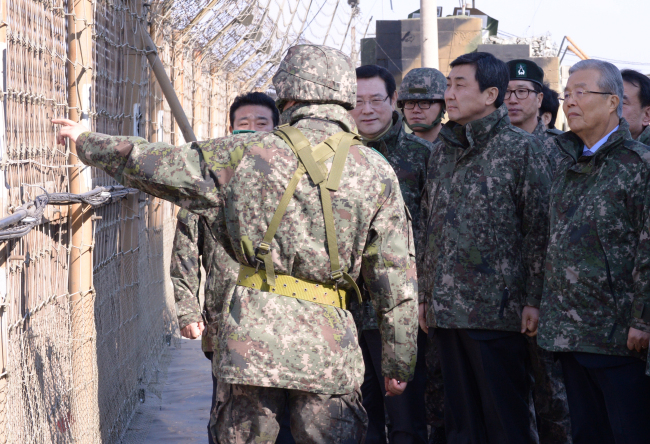South Korea will elect new National Assembly members in a general election on April 13. The Korea Herald is publishing a series of articles on the candidate agendas, election trends and notable runners leading up to the race. This is the third installment. — Ed
In the weeks following North Korea’s long-range ballistic missile launch, national security has been on top of the agenda for all political parties here, overshadowing all other pending issues.
But now, with less than two months left to the general elections, the opposition camp appears to be watering down the national security frame and focusing more on other bread-and-butter economic issues.
The opposition bloc, mostly The Minjoo Party of Korea, have every reason to do so as the North’s repeated military provocations and growing tensions in the Korean Peninsula have given the conservatives an edge.
According to a survey conducted by local pollster Realmeter on Monday, the ruling Saenuri Party’s approval rating stood at 41.7 percent last week, up 2 percentage points from the previous week. That of President Park Geun-hye, too, rose by 3.7 percentage points to 45.9 percent, data showed.
“The national security situation has pushed conservative supporters to gain influence in the face of a potential crisis,” the pollster said in an analysis.
 |
| The Minjoo Party of Korea’s leader Kim Jong-in (right) and floor leader Rep. Lee Jong-kul (second from right) survey the readiness posture near the border in Paju, Gyeonggi Province, on Feb. 9. Yonhap |
Traditionally, the pacifist approach of the opposition camp during security crises — that prioritizes peace and dialogue before pressure and sanctions — has not worked in their favor, especially in times of major elections.
Back in December 2012, with only a week remaining for the 18th presidential election, North Korea launched a long-range rocket, which heightened tension and drew voters to the Saenuri camp.
The opposition’s counterclaim that the rival is using the cross-border tension politically has failed to persuade the majority of conservatives and centrists, instead turning into a worn-out ideological dispute before fizzling out.
Apparently having learnt its lesson, the opposition party appears this time to be acting quickly to shift its policy focus away from security agenda to economic issues.
“The forced closure of the Gaesong industrial complex will adversely affect the economy,” said floor leader Rep. Lee Jong-kul in a parliamentary speech last Wednesday. The floor leader’s speech is usually considered an outline of the party’s policies.
“(The government and the ruling party) should refrain from expanding the current national security crisis into the diplomatic and economic sectors as well,” he said. The joint industrial park in the North Korean city was shut down on Feb. 10 in response to Pyongyang’s Feb. 7 long-range rocket launch.
Rep. Lee spent most of his speech proposing the party’s economic blueprint.
“For the past eight years, conservative administrations have built up a debt-dependent economic model which now needs to be drastically corrected,” he said.
The party’s policy committee, too, announced a set of key election slogans the following day, focusing on fair growth and adding momentum to the economic drive.
Adding to the list of reasons for the Minjoo Party to avoid highlighting the security agenda is the disputed position of some of its members, including its current leader, over North Korean affairs.
“I believe that the North Korean regime will one day collapse and that the Korean Peninsula will be unified,” said the party’s interim chief Kim Jong-in during his visit to an army division days after the recent rocket launch.
His comments, which clearly contradicted the party’s identity which is largely based on its former leaders’ “Sunshine Policy” and the vision for inter-Korean engagement and dialogue, triggered immediate criticism, even giving room for the rookie People’s Party to cut in.
“The president, the ruling party and even some of the opposition party members speak of the collapse of the North Korean regime, but this stance is of no help to promoting national security or to building peace in the peninsula,” said party chief Rep. Ahn Cheol-soo.
As speculation mounted over the Minjoo Party’s security platform, former leader Rep. Moon Jae-in attempted to water it down.
“From North Korea’s nuclear and missile (tests), to the shutdown of Gaesong industrial park, it all comes down to a complete failure of the Park Geun-hye administration’s North Korean policies … But these defeated people are showing a bold front and blaming it all on the past governments,” Moon tweeted on Feb. 19. “Now with even some of the opposition members following the trend blindly by talking about reassessing the (accomplishment) of the sunshine policy, it is incredibly regretful.”
In response to reporters’ questions about how he viewed Kim Jong-in’s remarks that were critical of the engagement policy, Moon shrugged, saying, “People do not have to see eye-to-eye all the time.”
Meanwhile, the ruling Saenuri Party continues to capitalize on the North Korean issue, using it to rekindle its national security election agenda and to criticize the opposition camp.
“The Minjoo Party acted as though it would for once take a firm stance against North Korean provocations, but its move turned out to be no more than a pretense to win support ahead of elections,” said the Saenuri floor leader Rep. Won Yoo-chul.
“Its way of blaming the government over the recent situation reflects its lack of awareness and capacity when it comes to national security.”
By Bae Hyun-jung (tellme@heraldcorp.com)

